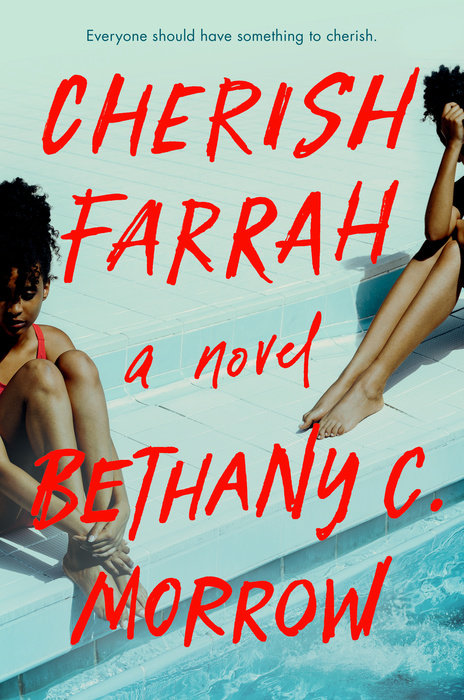The world cerebral gets thrown around a lot, which means it has, like so many other words, lost a bit of its impact. But there’s no better descriptor for Bethany C. Morrow’s Cherish Farrah. Besides being a novel that pulls readers into the psychological unraveling of a young woman facing major life changes, it also cuts deep into the inner workings of racism, socioeconomic background, utilitarian friendship, young love, and the masks people wear—and think others are wearing—while dealing with the world.
Farrah Turner is seventeen, and she’s one of only two Black girls in her country club community. She’s also a very visible minority at school, and she’s the only one who has Black parents because Cherish Whitman, her best friend, also Black, was adopted by a doting white couple. When Farrah’s parents suddenly find themselves in a rough financial situation, they have to move, putting up their house for sale. For Farrah, the loss of the house equals a loss of status, and she starts to feel she’s at the bottom rung of the social ladder.

While her parents get things sorted, Farrah moves in with Cherish and her family, but although Cherish is Black, her parents have given her everything and spoiled her to the point that Farrah refers to it as her being WGS—“White Girl Spoiled.” Farrah wants to stay in control of the situation, and she wants to stay with the Whitmans as long as possible. Unfortunately, Farah’s mother, a strict Black woman who has shown Farrah most of what she knows about control, getting her way, and wearing a mask, is trying to convince her that she belongs at home and that there’s something off about the Whitmans. While Farrah and Cherish, who are inseparable, try to cope with their situation while stuck in the interstitial space between childhood and adulthood, strange things start to happen at the Whitmans’ place: Cherish’s mother gives her a bizarre gift, Farrah gets very sick, she finds a strange journal, and the young men she and Cherish like make things even more complicated.
Cherish Farrah works on various levels. For starters, there’s a lot going on that readers don’t know, but Morrow shows us just enough to wonder. This makes the novel a bizarre literary puzzle that keeps you entertained as you read, always putting pieces together and waiting for the next clue, the next fragment, the next revelation. Also, Farrah is a unique narrator who’s flawed, hurt, and obsessed with one thing: “Control. Control. Control.” Every conversation that takes place in the novel takes place on two levels simultaneously. The first is what’s being said; the words being uttered at face value. The second space is inside Farrah’s head, and this is where things get both complicated and interesting. Farrah loves Cherish, and she also hates her and everything she has. Farrah knows her parents are doing what they can, but she also resents them and is constantly fighting with her mother even when she’s not around. These dichotomies make for very real characters, but also unreliable narrators, and in this narrative, everyone is unreliable.
Another element of this novel that merits attention is the way Morrow deal with performance. In a way, Farrah sees Cherish as a Black girl who performs whiteness really well because of her parents, and that is something that created a space in Cherish she could take over:
“Cherish was a spoiled white girl who also happened to be Black, and it mean that the consequence of coddling, the incompetence it breeds, was dangerous. It meat that there was a void inside her, but because she was a Black girl, too, it meant that I could fill it.”
However, Farrah is also a performer. She is constantly worrying about controlling situations and being able to dictate what the narrative will be. Every one of her actions and reactions happen after a lot of thought, even if they appear to be immediate. This is because she is always observing, thinking, calculating. Farrah is very mature in some things and very immature in others, but the cynical way in which she sees the world and the people in it forces her to act like an adult—or her version of an adult—instead of reveling in the occasional fun that comes from seeing the world as a teenager:
“I send back a kiss emoji and blast the music as I pull onto the highway to head back to my side of town. It doesn’t matter what music in particular; I’m cosplaying a teenage girl, reveling in an obnoxious display of self-centeredness meant to declare that I’m carefree—even though it’s safer to be constantly aware. Constantly observant, and interpreting; your outward behavior a decision based on forethought, nor narcissism.
Ultimately, Cherish Farrah triumphs not only because of the elements discussed above but for two things I haven’t talked about yet. The first is that the narrative takes place in the real world but also inside Farrah’s head, and her head can be a dark, weird, claustrophobic space. In terms of character development, Morrow pulled off something special here: a brooding, manipulative, insecure young woman who’s also a victim and, strangely enough, likeable. Character like that don’t come around every day. The second thing is that this is an unexpectedly dark novel. In fact, I’d argue that the passages in which Farrah and Cherish flirt with death by holding each other under water (they call it baptism) are as creepy as anything you’d find in a horror novel. However, that’s only the tip of the proverbial iceberg in terms of darkness. In this book, Morrow delves deep into the way we use others to get what we want, digs into what it means to lose your social standing, and looks at how racism operates not only in rich neighborhoods and schools but also within the twisted core of a biracial family. Like I said, if you like them cerebral—and dark—don’t skip this one.



